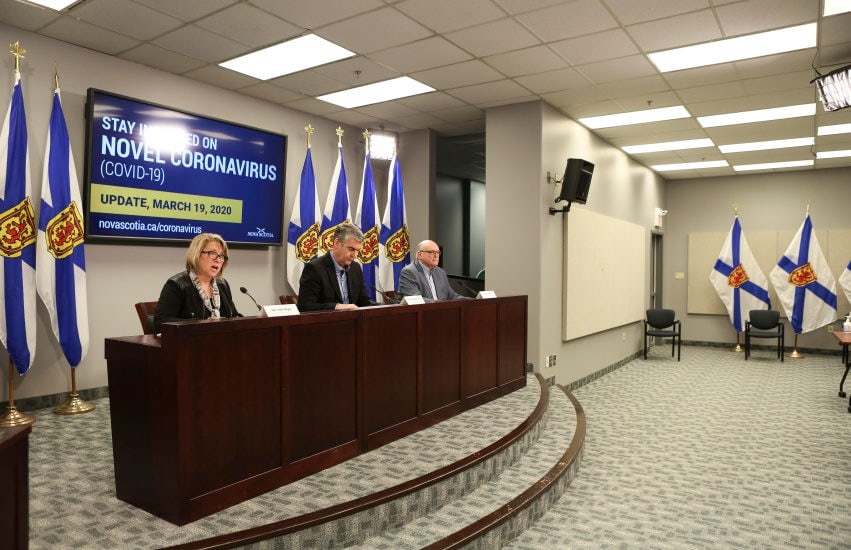
KJIPUKTUK (Halifax) – Today Kelly Regan, Minister of Community Services, joined the daily COVID-19 government press conference to discuss what her department is doing to help income assistance recipients and other low income people .
Not very much at all, it turns out.
Individuals on income assistance are to receive a one-time sum of $50. People who use direct deposits should have the money in their account by the end of the week, Regan said.
She also announced $1 million for Feed Nova Scotia, to purchase food, pay for additional Feed Nova Scotia staff and help with its logistical network.
Meanwhile, Premier Stephen McNeil told reporters during the live-streamed press conference that, as in Ontario, British Columbia and other provinces, landlords will not be able to evict tenants for the time being.
The moratorium in evictions is good news, but it’s good news with a big asterisk. The other new measures are not even that. And then there are the things the department isn’t doing.
Eviction protection is limited
The eviction moratorium first. These evictions are a real problem, and are becoming more and more frequent. Just last week the CBC published a story on several tenants in Dartmouth who were told by their landlord to vacate their rental units while renovations are occurring.
A subsequent rent increase of hundreds of dollars makes continuing to live there not an option. But neither is finding a place that is affordable these days, and tenants may well end up homeless. That’s a terrible predicament to be in at the best of times, but even more so during a pandemic.
Well, it turns out the eviction moratorium is not for those kinds of tenants, because their eviction is not directly related to COVID-19.
“No tenant can be evicted because their income has been impacted by COVID-19, effective immediately for the next three months,” the formal government announcement states.
So what about the extra money for income assistance recipients?
A one-time $50 to help people weather the coronavirus storm may sound generous, but only if you ignore the immense poverty income assistance recipients face in this province.
Regan mentioned how a family of four would receive a one-time $200.
To put that in perspective, a 2017 report by FoodArc on food security in Nova Scotia shows how at the end of the month a household of four relying on income assistance would be $51 in the red even without buying any food at all. After shopping for a nutritious diet that same family would be short $986. Now, for one month only, they will merely be short $786.
$1 million for Feed Nova Scotia
A million dollar for Feed Nova Scotia is a good thing, of course. But it’s not a whole lot of money in the grand scheme of things. Food banks are a wonderful institution, its volunteers deserve our deep gratitude, and in these times of austerity-induced suffering they need our full support.
That said, food banks are not very efficient in getting food to hungry families.
A recent study found that in 2012, there were five times more people living in a food-insecure household than those accessing a food bank. In fact, food bank use was one of the least common strategies employed by severely food-insecure households when they were short of money.
The risks of warehousing people during a pandemic
We have heard a lot about the dangers incarcerated people face because of COVID-19, but things inside institutions are no different.
People inside share washrooms and common areas, often they even share bedrooms. Try maintaining social distance in those places. Even though on lock down, they’re accidents waiting to happen. People may well die.
Tim Bousquet of the Halifax Examiner asked about the virus-related risks faced by the 800 or so people who are warehoused in institutions, often against their will.
You should ask the association that runs these places, I can set something up for you, was all Regan said.
Tackling the risks of homeless shelters
One thing that wasn’t discussed was the homeless shelter situation here in Halifax and elsewhere in the province. Homeless people sleep on cots, sometimes 25 people in one room. Remember how we are supposed to maintain social distance?
There’s an opportunity to put these people up in hotels, but this apparently is not a priority in the department’s view.
With a special thanks to our generous donors who make publication of the Nova Scotia Advocate possible.
Subscribe to the Nova Scotia Advocate weekly digest and never miss an article again. It’s free!




While the spin around the eviction moratorium sounded good, the details make clear that it is not intended to help most of those on social assistance.
Because they won’t be able to point to a ‘drop in income’ as a result of the virus, they won’t be able to benefit from the Province’s announcement–the ‘eviction moratorium is not for IA recipients–even tho having a home is the first defense against the virus:
(https://twitter.com/leilanifarha?lang=en)
Shame!
Vince Calderhead